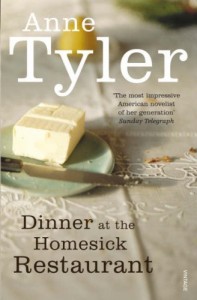 DINNER AT THE HOMESICK RESTAURANT
DINNER AT THE HOMESICK RESTAURANT
Tyler, Anne (Random House, reprint July 2012, ISBN:1446426718, 9781446426715)
I don’t know if they still do it like this, but back in the 80s, year 12 English at high school seemed to consist almost entirely of reviewing books for a theme. I was lucky enough to get a theme back in 1989 of ‘The Family’ – lucky because it was in that class that I was introduced to Anne Tyler.
There was dissent in the classroom when we read this book. Out of the 20 odd people in my class, the dissent was pretty unevenly divided: 19 people hated this book with a passion, one person (me) loved it with equal passion. I don’t know why they all hated it – perhaps it’s because it was literature; and literature never rounds up things into a nice bundled happy ending, which is the sort of book most people would have been reading when they are 16 or 17. I recall the dragonlance books were a bit popular in my school at the time. You know who the goodies and the baddies are and you know it’s all going resolve well. However – I’m ok with bittersweet or unspecified endings, your brain fills in the gap and you work it out. I read “Rebecca” in about year seven and that one leaves so much undone that I learned pretty early that was ok in a book. I also like a good, slow, gentle progression of a story, where the change is in the people the story is about – or more tragically, there is very little change in the people the story is about.
The issues you have with family don’t resolve themselves at a dinner, or a lunch, or a wedding, or a funeral. The occasions you do get together with your family can be littered with frustration, recrimination of past crimes against each other, and the forming of new alliances and new battles. Family is something you get and like all relationships, you have to all put aside the petty stuff to work on getting good strong interactions going. In my experience the times where family sort things out are few and far between and members of a family resume their traditional roles at all the gatherings. Even if you mean to behave differently, you are still the child when you meet up with other adult siblings at a parent’s house – and this is really the bread and butter of Dinner at the Homesick.
It’s very hard to put aside the petty stuff and behave to family as you would towards acquaintances – as one of my friends pointed out recently: “Families are good at pushing your buttons – they are the ones who put them there.” We all know those behaviors you grew up with and around, and you can still get that same response of feeling when you see, say, your brother as an adult doing and saying the same thing that used to rouse to you insanity as a child.
Homesick follows from just prewar to the late 70s with one small family (Mother, three children, other optional extras like partners) and they all get at least two chapters that focus on their points of view. We see multiple stories threading and weaving and Tyler pulls the characters in and out of each others orbits – you get a level of empathy and sympathy with characters who appear very flawed when viewed from the outside, but whole when you follow their thoughts and reasoning.
I can recommend pretty much any of Tyler’s work. I was hard pressed to pick a single book of hers to review, so I chose the first one I read, though there are a few others I think are even better. She’s still writing, which is just excellent too, more to look forward to!


I was one of the people who loathed this book. We read in year 10 and I was in the middle of a teenage existential crisis, so some of it may have been bad timing, but it was just so bleak, how miserable and directionless these characters’ lives were. I don’t mind poignant and miserable endings in literature, but this book painted such an awful picture of adulthood.
Yeah I totally don’t get that. It’s a book full of moments of joy and fun, incredibly clever. I can see why kids hate it. Actually I can see why adults hate it but I thought it represented a family very well; also all the characters find some sort of peace and contentment with their lives. But it’s very subtle, and way more like real life than most books. I would actually say it’s got a very happy ending – Cody gets the respect from his father he spends the entire book craving and also gets to tell him off!